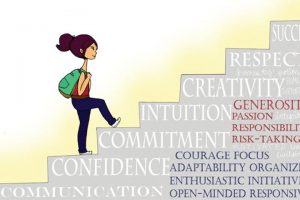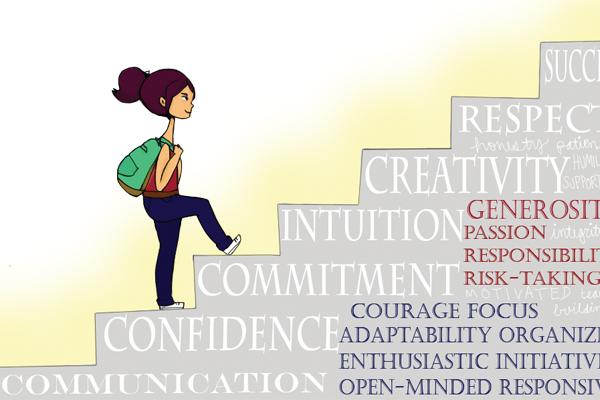The opportunities Hockaday has given students are conducive to their development as leaders

Newly elected Student Council members will soon receive multiple opportunities to test the theory about whether leaders are born or made.
The results of a recent Student Council StrengthsQuest assessment indicated that Hockaday does a good job of turning girls into future leaders and that council members and their classmates have different types of extroverted and introverted leadership skills.
The Student Council took the assessment survey in preparation for the Strengths and Leadership Student Council Workshop that took place on April 9.
According to an article by Dr. Ronald E. Riggo, a professor of leadership and organizational psychology at Claremont McKenna College and the author of Psychology Today’s Cutting-Edge Leadership blog, surveys such as the one Student Council members took help students pursue leadership positions and create leader self-development plans.
In his article, Riggo said that “the job of leading an organization is fantastically complex,” and currently “there is tremendous interest in leadership and in leader development.”
Upper School counselor Dr. Margaret Morse believes that council members and other students have Hockaday teachers and classroom curriculums to thank for properly developing their fledgling leadership skills.
“The whole school is focused on helping young students find their voice,” Morse said. “The school wants every student to know how to research, understand a topic, make sense of it for themselves, synthesize information and say something about it. The skill sets that they learn through the curriculum are critical to being an effective leader.”
According to Morse, students at Hockaday learn many more critical thinking techniques than they would at other public or private schools because of Hockaday’s unique curriculum.
“Other schools may just be regurgitating what is told in textbooks and supplemental classroom materials,” Morse said. “Knowing how to take a certain kind of test does not facilitate a higher level of critical thinking.”
She added that the way teachers educate and the things they value in the learning process encourages students to become strong leaders.
Upper School Student Council President and junior Frances Burton agrees with Morse and affirms that these points are being efficiently communicated to Hockaday students.
“Our classroom settings allow for conversation and articulation of thoughts in front of people,” Burton said. “The classroom settings are small, but this is good practice because in the real world, leaders are in front of much larger groups of people.”
Burton believes that an all-girls school setting creates a warm and welcoming environment, in which students can find their own voice among a multitude of opportunities.
“With school activities, Hockaday just has a wide variety of ways for students to get involved in things they are passionate about,” Burton said.
She added that there are other opportunities besides Student Council.
“There are lots of clubs, sports and music,” Burton said.
“There are also social activities that allow students to lead in ways they are uniquely interested in. If you don’t want to be Student Council president, you can be president of something else.”
Student Council activities and the all-girls environment have enabled Burton to find her own voice and use that voice to help other students.
“We are taught to be a change in the world and not suppress our voices,” she said. “Girls should be enabled to have these skills to help them survive and thrive in the world. I know that in the Hockaday environment, what I say has the potential to make a positive difference to another student.”
The Student Council leadership workshop survey results listed empathy for others and being change agents as leadership skills that are favored by both council members and the staff who oversees the council.
Morse and Assistant Head of Upper School Elizabeth Jones continued to list numerous other leadership skills and traits and agreed that leaders are, for the most part, made and not born.
“One might argue that leaders are born with certain kinds of traits,” Jones said. “But, this doesn’t mean someone is a born leader. This just means someone can be a different type of leader depending on what she can offer a community.”
Jones, Burton and Morse agree that the best leaders share many of the same traits, such as the abilities to listen to others, accept the opinions of others, be honest, be humble, be fearless, stand up for personal values and know when to ask questions or ask for help in an effort to seek greater understanding of difficult concepts.
“Leaders have great interpersonal skills and can sit with people through difficult conversations,” Morse said. “Leadership is not just about having a title. I appreciate leadership that involves taking in different viewpoints before making a decision and be willing to stand up for that decision.”
Morse also said the best leaders are more empathetic and more humble than people who are not leaders.
“The people I admire the most are people willing to admit they were wrong or made mistakes,” Morse said. “It is best to go backwards, make apologies and move forward. I don’t respect too many people who are stubborn. A lot of people gravitate more towards leaders who are human.”
Burton said she gravitates towards leaders who are more extroverted but that introverted leaders do have skills and traits that are beneficial in certain types of group settings.
According to Burton, there is not that much of a difference between extroverted leaders and introverted leaders.
“I think leadership, in its essence, has to come out in social settings,” Burton said. “Social settings are perfect settings for developing leadership skills because leaders get feedback from the people who follow them.”
Extroverted leaders are more easily identifiable. However, Morse added that introverted leaders do exist and that people just have to think harder to find them and understand the impact of their leadership style.
Available to help council members and students develop and assess the impacts of leadership styles are best-selling books on leadership such as Sheryl Sandberg’s “Lean In,” Doris Kearns Goodwin’s “Team of Rivals,” Stephen Covey’s “The 7 Habits of Highly Effective People” and Simon Sinek’s “Start with Why.”
Other best-selling books on leadership, specifically good for high school and college students to read, are Jim Collins’ “Good to Great,” Tony Hsieh’s “Delivering Happiness,” Seth Godin’s “Tribes,” Daniel Pink’s “Drive,” Alfred Lansing’s “Endurance” and Patrick Lencioni’s “The Five Dysfunctions of a Team.”
Riggio said, in one of his Psychology Today articles, that people who use resources for leadership development should continue to remind themselves “most of leadership is made, not born.”
“The fact that leadership is mostly made is good news for those of us involved in leadership development —leaders can indeed be developed,” Riggio said in his article. “Yet, there is some raw material, some inborn characteristics that predispose people to be and become leaders.”
Jones said that leaders should find a style that fits their abilities and comfort zone. If leaders try to be people they are not, their messages will not find the right audience.
“How you lead would be different from how I lead because we are different people,” Jones said. “I think, in order to effectively lead, leadership requires a level of authenticity. It has to be your own style. This is what makes someone a genuine and true leader as opposed to someone trying to lead in a way that makes people uncomfo r t a b l e because she went outside of who she truly is.”
Jones believes Hockaday provides a unique environment in which people, such as faculty and staff who currently are leaders, can teach students and alumnae to be future generations of leaders.
“Leader ship is something that you learn,” Jones said. “Leadership is something that takes a great deal of practice, which is exactly what we do here at the school. We can never be perfect at it. We can always improve upon it.”
– Catherine Jiang













